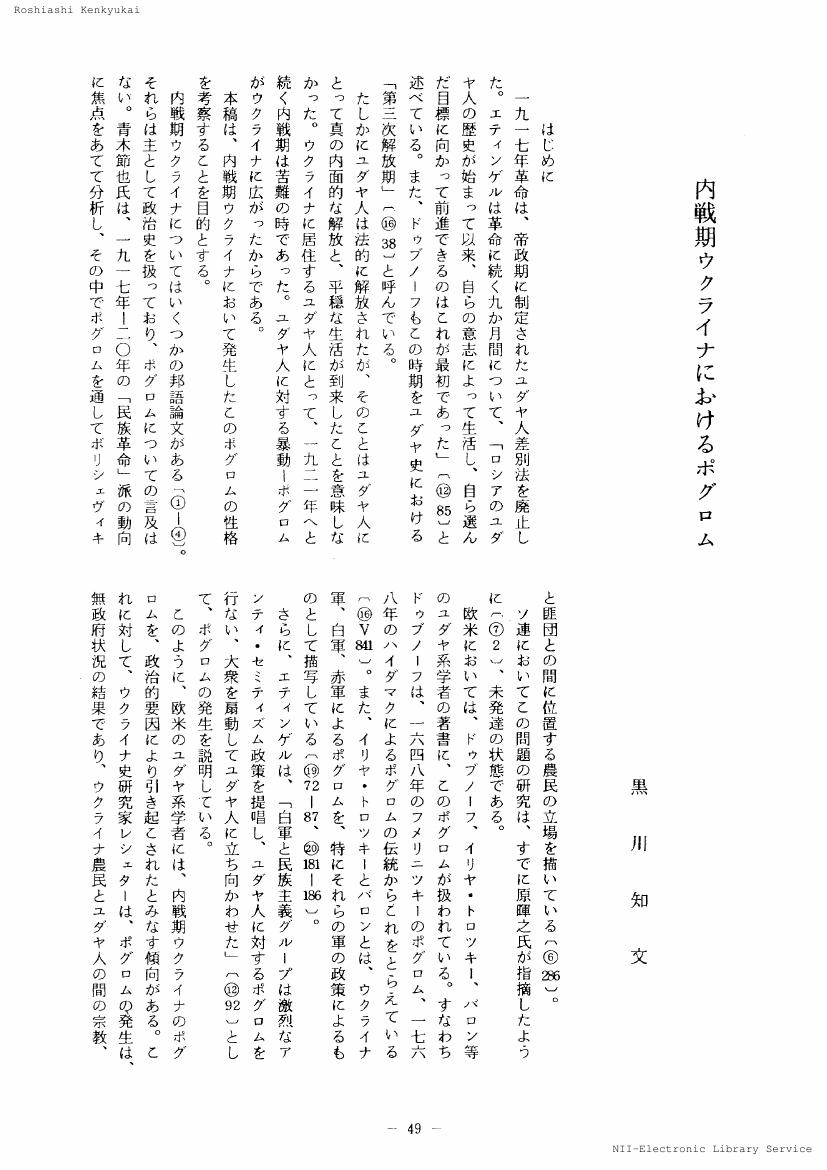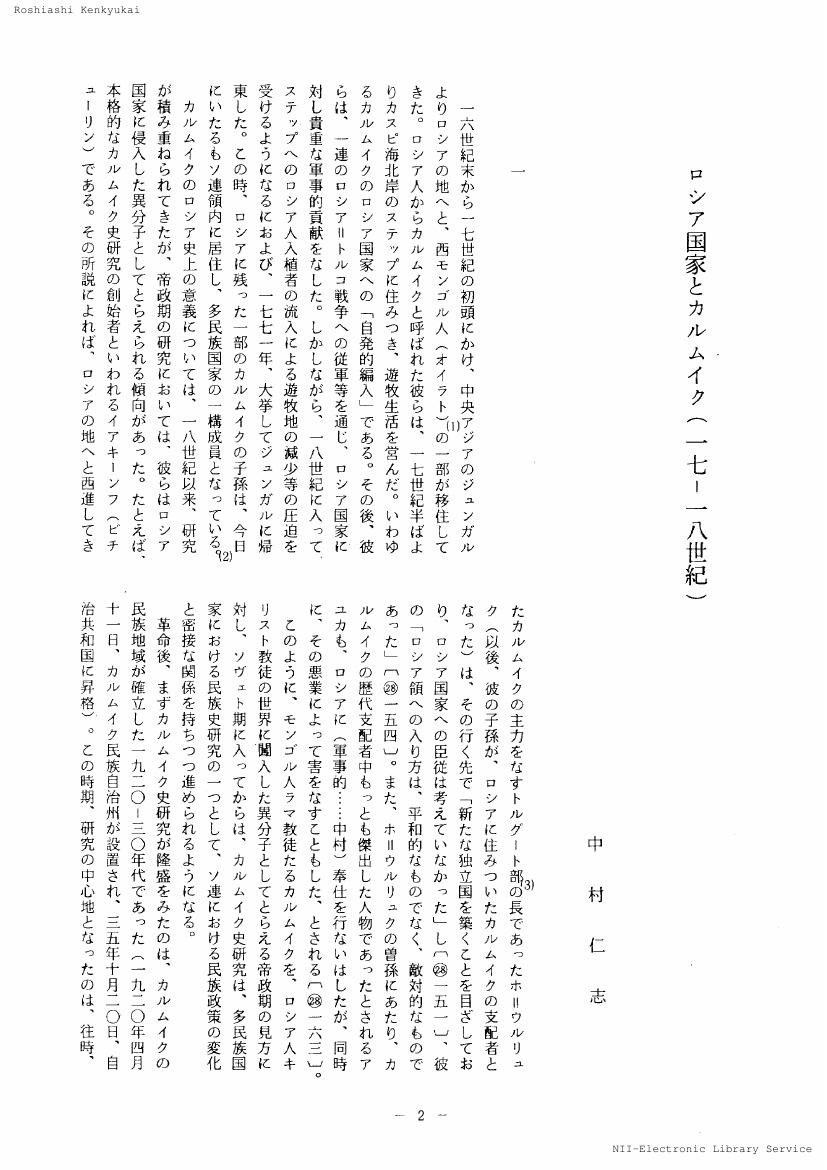18 0 0 0 OA 内戦期ウクライナにおけるポグロム
- 著者
- 黒川 知文
- 出版者
- ロシア史研究会
- 雑誌
- ロシア史研究 (ISSN:03869229)
- 巻号頁・発行日
- vol.40, pp.49-58, 1984-11-03 (Released:2017-07-25)
16 0 0 0 ノモンハン事件と独ソ不可侵条約締結
- 著者
- 駒村 哲
- 出版者
- ロシア史研究会
- 雑誌
- ロシア史研究 (ISSN:03869229)
- 巻号頁・発行日
- no.53, pp.68-82, 1993-07-30
15 0 0 0 慶應義塾生ロマン・キムの運命の分水嶺としてのロシア革命
- 著者
- クラノフ アレクサンドル 生田 美智子
- 出版者
- ロシア史研究会
- 雑誌
- ロシア史研究 = История России (ISSN:03869229)
- 巻号頁・発行日
- no.102, pp.81-95, 2018
13 0 0 0 OA 総力戦と体制崩壊 : 第一次大戦期の食糧事業を素材として
- 著者
- 松里 公孝
- 出版者
- ロシア史研究会
- 雑誌
- ロシア史研究 (ISSN:03869229)
- 巻号頁・発行日
- vol.46, pp.26-64, 1988-06-01 (Released:2017-07-25)
12 0 0 0 OA 同志裁判所にみるソヴェト国家・社会・個人
- 著者
- 河本 和子
- 出版者
- ロシア史研究会
- 雑誌
- ロシア史研究 (ISSN:03869229)
- 巻号頁・発行日
- vol.89, pp.23-39, 2012-01-31 (Released:2017-07-25)
В конце 1950-х - начале 1960-х гг. в СССР много говорилосв о том, что в процссе дальнейшего развития социалистической демократии должно произойти постепенное превращение органов государственной власти в органы коммунистического общественного самоуправления. Именно в это время не только на предприятиях, в различных учреждениях и организациях, но и при городских домах, обслуживаемых ЖЭКами, домоуправлениями или объединяеых уличными комитетами, а также в сельских населенных пунктах по всему Совесскому Союзу было создано огромное количество товарищеских судов с целью того, чтобы общественноть самостоятельно разбирала некоторые проступки и мелкие правонарушения граждан, частично выполняя при этом функции государственных судов. Одновременно с этом товарищеский суд был призван содействовать воспитанию граждан в духе коммунистической идеологии путем общественного воздействия на нарушителей правил социалистического общежития. Вследствие этого, возникала возможность прямого вмешательства в личную жизнь граждан со стороны общества и власти. Дела, рассматриваемые товарищескими судами, в общем, могут быть разделены на три категории: 1) дела по нарушению трудовой дисциплины; 2) дела по нарушению общественного порадка, в том числе дела по спорам, возникающими между гражданами; 3) дела по семейным спорам. Таким образом, с точки зрения повседевной жизни, компетенция товарищеского суда была крайие шинока, однако это не означало, чло общественность всегда имела право вторгаться в личную жизнь граждан. Как правило, считалось, что товарищеский суд не может вмешиваться в обдасть любовного чувства между мужчиной и женщиной, хотя вмешательство в такие отношения также не было полностью исключено. Таким образом, можносказать, что личная жизнь постоянно подвергалась угрозе вмешательства со стороны общества в лице товарищеского суда. С другой стороны, такой интерес общества к частной жизни мог оказать иной эффект. Например, когда прогулы совершались по причине семейного конфликта, товарищеский суд нередко принимал во внимание обстоятельства жизни в семье нарушителей и выносил более мягкие решения. Иными словами, плоисходящее в личной жизни могло оказывать свое влияние на общественную и публичную жизнь челогека.
- 著者
- 藤沢 潤
- 出版者
- ロシア史研究会
- 雑誌
- ロシア史研究 (ISSN:03869229)
- 巻号頁・発行日
- no.90, pp.3-20, 2012-06-12
In the 1970s, Brezhnev faced a turning point in the foreign policy. Having achieved remarkable diplomatic success through the conclusion of the Moscow treaty with West Germany and SALT I treaty with the United States, He wanted to improve the relations with the West further. But Suslov and other ideologues inside the Soviet leadership, concerned about the diminishing anti-imperialist nature of the Soviet foreign policy, called for a more active internationalist policy. Although Brezhnev rejected such an overall ideological offensive against the West, he recognized the need to launch counteroffensives against Chinese political and ideological challenges all over the world. To retain the Soviet position inside the international communist movement, the Soviets found it necessary to contain the Chinese influence in the Third World by supporting the liberation movements. Brezhnev, despite his will to make detente irreversible, thereby heightened the East-West tensions, which culminated in the collapse of the detente. As official Soviet documents are still unavailable, this account is based largely on the memoirs of former Soviet diplomats and East German archival sources.
- 著者
- 池田 嘉郎
- 出版者
- ロシア史研究会
- 雑誌
- ロシア史研究 = История Россия (ISSN:03869229)
- 巻号頁・発行日
- no.97, pp.27-42, 2016
6 0 0 0 OA 中井和夫, 『ウクライナ・ナショナリズム』, 東京大学出版会, 一九九八年
- 著者
- 中村 裕
- 出版者
- ロシア史研究会
- 雑誌
- ロシア史研究 (ISSN:03869229)
- 巻号頁・発行日
- vol.65, pp.103-107, 1999-10-30 (Released:2017-07-25)
5 0 0 0 レフ・グミリョーフをめぐってあれこれ
- 著者
- 安井 亮平
- 出版者
- ロシア史研究会
- 雑誌
- ロシア史研究 (ISSN:03869229)
- 巻号頁・発行日
- vol.53, pp.61-67, 1993
5 0 0 0 OA A・A・ボグダーノフの宇宙観と人間観 : 協働による集団的肉体の創造
- 著者
- 佐藤 正則
- 出版者
- ロシア史研究会
- 雑誌
- ロシア史研究 (ISSN:03869229)
- 巻号頁・発行日
- vol.58, pp.60-68, 1996-03-30 (Released:2017-07-25)
4 0 0 0 OA 戦後ソ連における歴史家と歴史学 : ソ連史学史ノート(その一)
- 著者
- 和田 春樹
- 出版者
- ロシア史研究会
- 雑誌
- ロシア史研究 (ISSN:03869229)
- 巻号頁・発行日
- vol.25, pp.2-32, 1976-06-19 (Released:2017-07-25)
4 0 0 0 OA 流れの変化に抗する歴史家たち : ソ連史学史ノート・一九六四-六六年
- 著者
- 和田 春樹
- 出版者
- ロシア史研究会
- 雑誌
- ロシア史研究 (ISSN:03869229)
- 巻号頁・発行日
- vol.32, pp.2-25, 1980-11-07 (Released:2017-07-25)
4 0 0 0 第二次世界大戦期サハリン周辺海域の航行問題
- 著者
- 兎内 勇津流
- 出版者
- ロシア史研究会
- 雑誌
- ロシア史研究 (ISSN:03869229)
- 巻号頁・発行日
- vol.99, pp.3-25, 2017-05
4 0 0 0 「尼港事件」の諸問題 (シベリア戦争特集・2 : 尼港事件)
- 著者
- 原 暉之
- 出版者
- ロシア史研究会
- 雑誌
- ロシア史研究 (ISSN:03869229)
- 巻号頁・発行日
- no.23, pp.2-17, 1975-02-28
- 著者
- 宮崎 千穂
- 出版者
- ロシア史研究会
- 雑誌
- ロシア史研究 = История России (ISSN:03869229)
- 巻号頁・発行日
- no.106, pp.104-131, 2021
3 0 0 0 森林とロシア革命
- 著者
- 奥田 央
- 出版者
- ロシア史研究会
- 雑誌
- ロシア史研究 = История России (ISSN:03869229)
- 巻号頁・発行日
- no.106, pp.3-29, 2021
- 著者
- 根村 亮
- 出版者
- ロシア史研究会
- 雑誌
- ロシア史研究 (ISSN:03869229)
- 巻号頁・発行日
- no.76, pp.153-168, 2005-05-25
Why vodka monopoly was introduced in Russia? Russian government and S. Witte, minister of finance insisted that government control of vodka trade was required for resolution of the alcohol problem. The monopoly, however, didn't reduce vodka production and supply, and could not resolve the alcohol problem. Thus many studies concluded that the monopoly was required for the fiscal reason. But the vodka monopoly needed enormous expense. In fact even in those days, it was doubted that vodka monopoly earned net profit. I think that two elements are important factor of introduction of monopoly. First of all the monopoly was one of counter Great reform policies. Secondly Witte wanted that Russian empire underwent industrious development. So his essential economic policy was to build an economic infrastructure and stimulate economic development. He reformed tax systems to increase fiscal income. In the case of the vodka monopoly, however, most important purpose was considerable expense itself, which would stimulate Russian economy. The vodka monopoly was rather economic policy than fiscal policy.
3 0 0 0 OA ロシア国家とカルムイク : 一七-一八世紀
- 著者
- 中村 仁志
- 出版者
- ロシア史研究会
- 雑誌
- ロシア史研究 (ISSN:03869229)
- 巻号頁・発行日
- vol.42, pp.2-17, 1986-02-20 (Released:2017-07-25)
- 著者
- バールィシェフ エドワルド
- 出版者
- ロシア史研究会
- 雑誌
- ロシア史研究 (ISSN:03869229)
- 巻号頁・発行日
- vol.84, pp.4-13, 2009
- 著者
- 岩下 明裕
- 出版者
- ロシア史研究会
- 雑誌
- ロシア史研究 (ISSN:03869229)
- 巻号頁・発行日
- vol.80, pp.45-59, 2007
This paper focuses on the Soviet attitude towards border delimitation between the Soviet Union and Japan before/during negotiations on normalizing relations after WWII. The so-called "four island" issue, e.g. Japan's strong territorial claims on Etorofu, Kunashiri, Shikotan and Habomai islets, was then not mentioned. The name of "northern territory" was given to the four islands in the 1960s only after the Soviet Union and Japan failed to sign the peace treaty. The normalization process between the Soviet Union and Japan in the 1950s presents the essential items for academic inquiry: Did the Soviet leadership have an option to return the four islands to Japan? Why did Nikiita Khrushchev suddenly propose to hand back the two islands, Shikotan and Habomai, to Japan during the London negotiations in 1955? Was there really a possibility that Japan would accept the two island proposal and sign the peace treaty? Why did the Soviet Union and Japan finally agree to sign the joint declaration in October of 1956 as proof of normalization and put a clause onto the declaration that stated the two islands would be transferred to Japan after the peace treaty was signed? Russian President Vladimir Putin has renewed Khrushchev's early position. Many hints for breaking the deadlock over the "northern territorial" disputes between the Soviet Union/Russia and Japan are furnished there.






